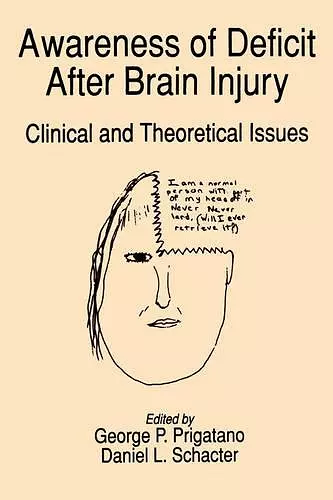Awareness of Deficit after Brain Injury
Clinical and Theoretical Issues
Daniel L Schacter editor George P Prigatano editor
Format:Hardback
Publisher:Oxford University Press Inc
Published:16th May '91
Currently unavailable, and unfortunately no date known when it will be back

This volume provides, for the first time, multidisciplinary perspectives on the problem of awareness of deficits following brain injury. Such deficits may involve perception, attention, memory, language, or motor functions, and they can seriously disrupt an individual's ability to function. However, some brain-damaged patients are entirely unaware of the existence of their deficits, even when they are severe and easily noticed by others. In addressing these topics, contributors cover the entire range of neuropsychological syndromes in which problems with awareness of deficit are observed: hemiplegia and hemianopia, amnesia, aphasia, traumatic head injury, dementia, and others. On the clinical side, leading researchers delineate the implications of awareness of deficits for rehabilitation and patient management, and the role of defence mechanisms such as denial. Theoretical discussions focus on the importance of awareness disturbances for better understanding such cognitive processes as attention, consciousness, and monitoring.
...interesting book...Any neurologist who is closely involved in the continuing management of patients who have suffered a stroke or head injury should read this book. It will stimulate thought about the experience of our patients and will thereby help us understand their bizarre experiences. * Journal of Neurology, Neurosurgery, and Psychiatry *
The scope is extremely wide ranging ... The reviews have been written by some of the leading authorities in various fields and and enormous body of literature has been covered succinctly, in a very readblae form. The chapters are clearly laid out and each follows a similar format covering anatomical issues, a review of the literature for the particular form of anosognosia and a discussion of the theoretical issues raised. * Dr Nigel North, Odstock Hospital, Salisbury, International Journal of Rehabilitation Research 15 (1992) *
For those of us who rehabilitate people with brain injuries, I consider this book a landmark event. It is probably one of the most important teaching tools for any member of the rehabilitation team. This book should be read by all who deal with these patients/clients; there is new knowledge to be found in this text even for the most sophisticated among us. * Henry H. Stonnington, Brain Injury, 1993, Vol. 7, No. 1 *
ISBN: 9780195059410
Dimensions: 162mm x 243mm x 23mm
Weight: 516g
288 pages